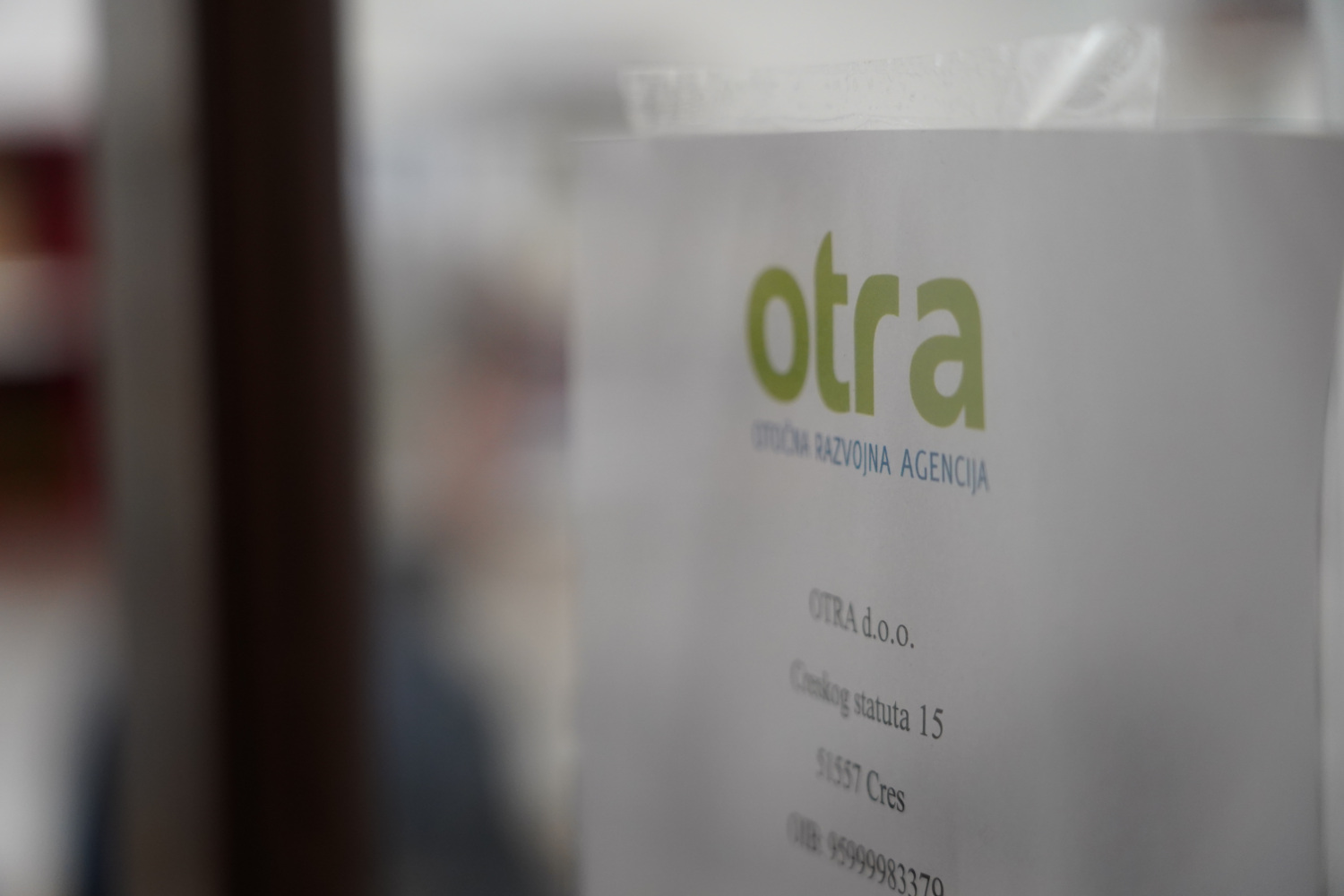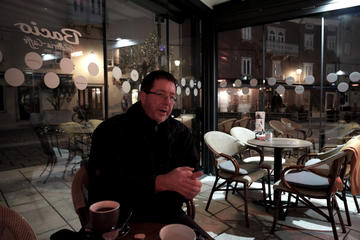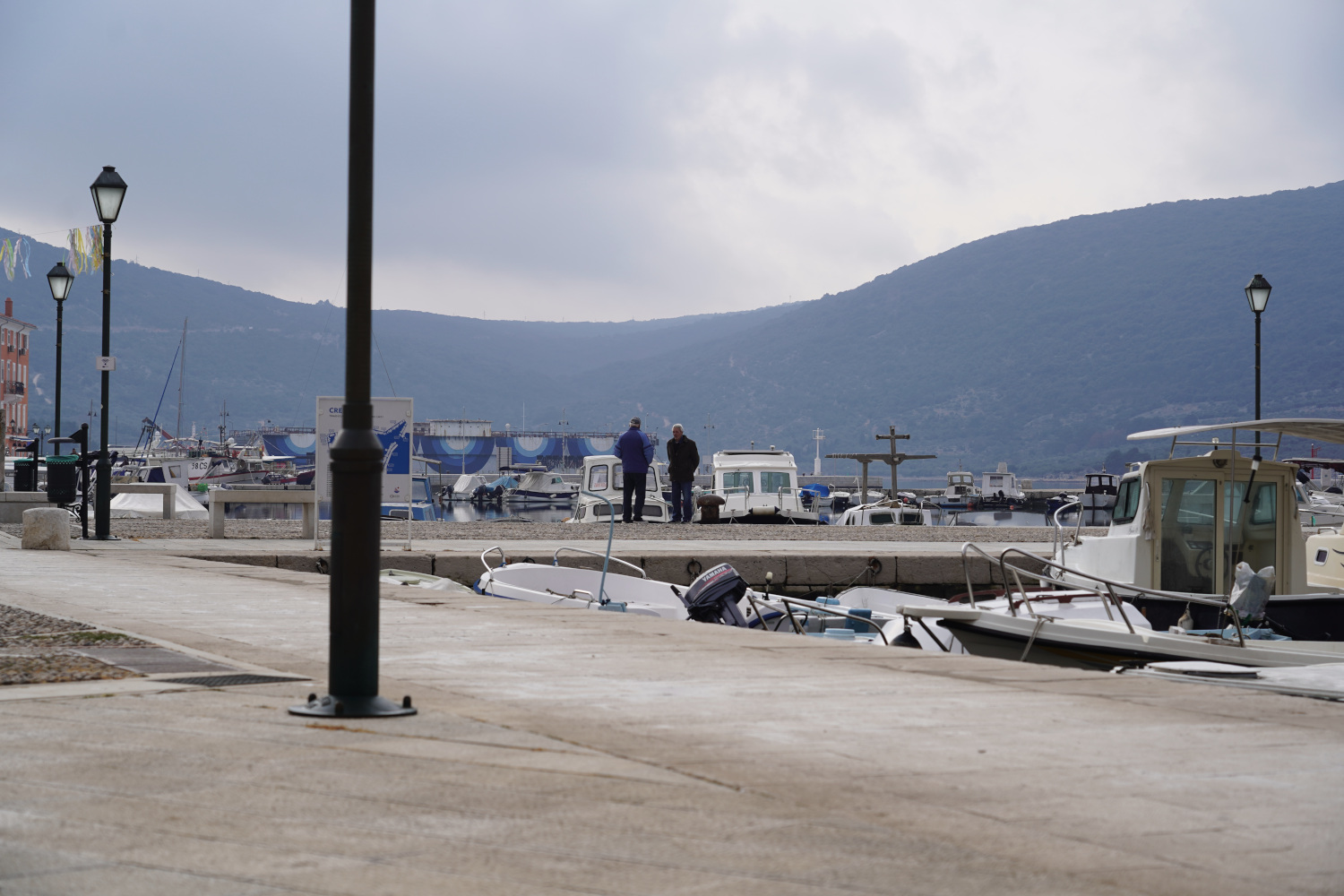
The entrance to the Otra Agency, in Cres - photo by Davide Sighele
In Cres and nearby Losinj there are many territorial development projects that can be promoted thanks to the support of the European Union. But nothing could be done without those who care about the future of local communities
We arrive in downtown Cres in the late afternoon, the colours already dull of a late winter day. Ugo Toic, director of the Otra local development agency, met us next to the seat of the Italian community on the island, the prestigious Palazzo Pretorio, renovated about ten years ago.
“It was my father Nivio who strongly wanted this location”, Ugo Toic tells us once we sat down at a table in one of the few bars open in the city out of season. So much so that at the inauguration of the renovated headquarters in 2013 – Nivio Toic had passed away a few years earlier – the ribbon was cut by his wife Bozena, as a sign of the community's tribute and recognition for the man who was a pharmacist, mayor, and key animator of the island community.
Toic speaks to us in an Italian that retains the breath and materiality of the sea, of the stone of the historic centres of the island's settlements, of the karst plateaus. Sometimes to clarify a concept he integrates with a few words in Croatian. "Just think that here, to define someone who comes from the mainland, we use furest, from foreigner, while if they come from the villages of the island, we use venski (from vanjski, in Croatian "the one from outside", ed.)".
Agronomist by profession, after some time spent away from the island he decided to return and deal with local development. "I couldn't stay away, I had to go back", he tells us to underline the attraction of these places that are marginal but at the same time unique.
“Otra, the agency that I manage, sees the participation of 50% of the municipalities of Cres and Mali Losinj – he explains – already in the 80s, in the Yugoslav era, in Mali Losinj there was a centre that dealt with the development of the islands of Adriatic. It also had contacts with the United Nations and in the early 1990s, thanks to a Japanese loan, it had created a programme for the management of the natural and cultural heritage of the archipelago".
Then little by little the activities had been concentrating only on the development of medium and small enterprises until they ran out and the centre remained an empty box. In the early 2000s, also thanks to the activism of Ugo Toic, people started right from what remained of the centre to create Otra and to promote a development strategy of the two municipalities: in the name of synergies and collaborations at European level.
Ugo currently works there with two collaborators. “But it depends on how many projects we have underway, now we are in a phase of stalemate in some ways, because it is halfway between the projects of the seven-year old EU cohesion policy and the new ones. But we are, for example, setting up two new Interreg Italia-Croatia projects, one dedicated to promoting the cultural heritage of the archipelago through virtual reality and the possibility of "visiting" the island as it was in the 15th century and the other to explore if there is the possibility of supporting start-ups locally”, he continues.
It clearly emerges from our conversation that – and fortunately – a large part of the economy of the island of Cres is based on tourism. This certainly cannot be ignored and in recent years it has ensured widespread well-being. But if one looks at sustainable development and wants to give those who do not have properties rented out to tourists the opportunity to stay and live in the area 12 months a year, one must also look at something else. “You often hear about start-up incubators, but they are always designed for urban centres. We would like to understand if they could also work in the islands or in rural areas – he explains – we are discussing it with the universities of Rijeka and Trieste. Here the quality of life is high, is there the possibility of attracting professionals who can telework, for example? We're wondering about it".
Ugo Toic then dwells on the critical issues in dealing with planning and development in a territory like that of Cres. “When it comes to sustainability, many aspects must be taken into consideration, the economic one, the environmental one, but also the social one. I find myself discussing with friends the fact that the cleaning of rooms rented to tourists is often not entrusted to regularly contracted people. Guaranteeing fair compensation for them too is part of the sustainability of our system”. Another element underlined is that the wealth that comes with tourism leads many to inertia. “Here it is difficult to think about the next 5, 10 years, the stomach is too full”, he says.
In other ways, planning, for one a municipality that has just over 3,000 residents during the year, is certainly not lacking. Two recently developed areas both refer, in their names, to the concept of an archipelago that unites Cres and Losinj.
Apsyrtides is a path for trekking enthusiasts that crosses the archipelago from north to south. Apsirtidi is the name that in ancient times designated the archipelago formed by Cres and Losinj and derives from the Greek hero Apsirto, one of the protagonists of the myth of the Argonauts, who died precisely on these islands at the hands of Jason and Medea.
The first section of the route was arranged and promoted in the context of the Interreg Italy-Croatia 2014-2020 project. "They are increasingly popular paths – says Ugo – also thanks to a special website that we have created".
"Apsyrtides" is also the name of a recently created cooperative with great ambitions. "The two municipalities of the archipelago, some local companies, and then numerous citizens are part of it – underlines Toic – the aim is to go and form a so-called energy community, aimed at the production and self-consumption of green energy".
Recently the cooperative, on an online platform, has launched an initial fundraiser for the purchase of land already destined, in the regional urban plan, for a photovoltaic system. "We set ourselves the goal of raising 60,000 Euros and in a few weeks we raised over 100,000 , a significant result for a community of a few thousand inhabitants. The idea was born in 2018 when, thanks to the interest of MEP Tonino Picula, we were involved in the initiative of the European commission Smart Islands . We were included among the six pilot islands for the definition of an ecological transition agenda, which was then implemented in 2019. Now we have started to put it into practice: the energy community is a consequence", says Toic. “The agenda is coordinated by the Otra Agency but managed in a participatory way. The cooperative is an example of this. We decided to opt for this legal status precisely so that each shareholder has one vote, regardless of the invested capital. Our goal is to propose projects in the field of energy transition that have a strong community influence".
As elsewhere in Europe Ugo Toic and the members of the “Apsyrtides” cooperative are now waiting for the full implementation in their country of the European directives concerning energy communities. To bring their project to fruition, they need Croatia, after amending two energy-related laws, to now approve their implementing regulations. "It has been at a standstill for a year, in Croatia everyone is waiting for them, but in the meantime we are moving forward", comments Toic.
It is not yet eight in the evening but the bar where we are is about to close. Before saying goodbye, we go to the office in Otra, a few steps away, on the ground floor of a building adjoining the Church of the Madonna delle Nevi, a basilica with three naves near the port. It is now dark, the lights on in the office illuminate some workstations and a large central table on which multiple copies of documents are stored in order. These are the prints ready to be delivered, the next day, for a tender. All around a rare silence – far away from the teeming summer evenings. The Madonna with child portrayed in a bas-relief on the church portal seems to be grateful.
This content is published in the context of the "Work4Future" project co-financed by the European Union (EU). The EU is in no way responsible for the information or views expressed within the framework of the project. The responsibility for the contents lies solely with OBC Transeuropa. Go to the "Work4Future"




















 To Top
To Top